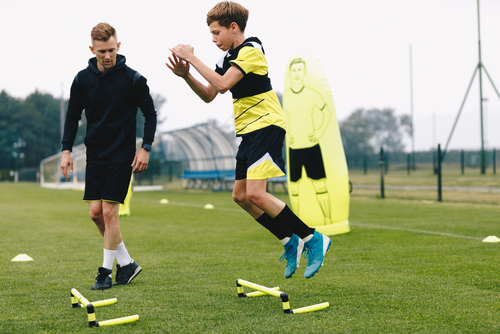Sport science is a multidisciplinary field that applies scientific principles and methods to help athletes understand and enhance athletic performance, exercise, and physical activity. It encompasses various scientific disciplines, such as physiology, biomechanics, psychology, nutrition, and anatomy, among others, and studies how the human body responds to physical activity and sports.
While many people who graduate with a degree in sport science may go on to work directly with athletes as coaches or trainers, many others in sports science careers go beyond those options, including injury rehabilitation, research, technology, and management.
Career Paths with a Degree in Sport Science
A sport science master’s degree can lead to many different career paths. Although earning a master’s degree in sport science is a popular path for physical education teachers and college coaches who want to deepen their understanding of the physical capabilities of their athletes, those are just two of the many options available. A degree in sport science can provide a strong educational foundation for a range of sports-related jobs that rely on scientific inquiry and experimentation to optimize performance.
Sports Scientist
Sports scientist is a blanket term that can apply to many different jobs and sport science careers. Like the field in general, a sports scientist specializes in the application of scientific principles and knowledge to improve athletic performance, prevent injuries, and enhance overall physical well-being. These individuals work across various areas of sports science, applying their expertise in fields such as exercise physiology, biomechanics, sports psychology, nutrition, and more. Most importantly, sports scientists focus on leveraging the scientific method to ensure their work is driven by the best available evidence.

Strength and Conditioning Coach
A strength and conditioning coach is a fitness professional who specializes in designing and implementing training programs aimed at improving an individual’s strength, endurance, power, and overall physical fitness. These coaches work with athletes, sports teams, fitness enthusiasts, and other individuals with a goal of improving performance.
Strength and conditioning coaches often work closely with athletes and coaches from various sports to optimize athletic performance. They may be employed by sports teams, athletic organizations, and fitness centers, or they may work independently with individual clients. Their expertise lies in understanding the principles of exercise physiology, biomechanics, and sports-specific training methods to help individuals achieve their peak physical condition.
Although a master’s degree in sports science provides a strong scientific basis for strength and conditioning, many strength and conditioning coaches achieve independent certification through organizations like the National Academy of Sports Medicine (NASM) or the National Council on Strength and Fitness (NCSF).
Physical Therapist
A physical therapist (PT) is a trained and licensed healthcare professional trained who helps individuals recover from injuries, manage pain, improve movement, and prevent disability. These professionals specialize in rehabilitative care and work with people of all ages to address a wide range of musculoskeletal, neurological, cardiopulmonary, and other physical conditions.
Physical therapists work in various settings, including hospitals, outpatient clinics, rehabilitation centers, schools, sports facilities, and patients’ homes. They collaborate with other healthcare professionals to ensure comprehensive care and help individuals regain maximum functional ability and independence after injuries, surgeries, illnesses, and other physical challenges.
A master’s degree is not sufficient to become a physical therapist. According to the American Physical Therapy Association (APTA), “to practice as a physical therapist in the U.S., you must earn a Doctor of Physical Therapy (DPT) degree from a Commission on Accreditation in Physical Therapy Education-accredited physical therapist education program and pass a state licensure exam.” However, a master’s degree in sports science can serve as an academic steppingstone to a Doctor of Physical Therapy (DPT) program.

Sports Nutritionist
A sports nutritionist is a specialized professional who focuses on the relationship between nutrition, exercise, and athletic performance. They provide guidance and create customized nutrition plans to optimize an athlete’s or an active individual’s health, energy levels, and performance.
Sports nutritionists often work closely with athletes, coaches, and other members of an athlete’s support team, such as strength and conditioning coaches and sports medicine professionals. They combine their knowledge of nutrition science with an understanding of the demands of different sports to help athletes achieve their peak performance while supporting their overall health and well-being.
Like strength and conditioning coaches, many sports nutritionists seek professional certifications in addition to or in place of a master’s degree in sports science. Certification is available through NASM, NCSF, as well as the International Sport Sciences Association (ISSA) and the American Council on Exercise (ACE).
The term sports nutritionist is not regulated in the same way as the title “registered dietician,” which requires more rigorous training and may or may not include specialization in sports and athletic performance.
Sports Biomechanist
A sports biomechanist is a specialist who applies principles of biomechanics — the study of the mechanics of human movement — to understand and enhance athletic performance, prevent injuries, and optimize movement patterns in sports and physical activities. Sports biomechanists work across various sports disciplines, collaborating with athletes, coaches, sports scientists, and medical professionals.
They use their expertise in understanding how forces, motion, and physical properties affect human movement to enhance performance, reduce the risk of injuries, and contribute to the overall advancement of sports science and athletic performance. Sports biomechanists may also assess and make recommendations for ways small mechanical changes in everyday behaviors, such as ergonomics and recovery processes, could improve athletic performance.
A master’s degree in sports science can provide a strong foundation for the study of biomechanics, as graduates may go on to pursue further specialized academic studies.
Sports Psychologist
A sports psychologist is a professional who specializes in the psychological factors that influence sports performance, athletic participation, exercise, and physical activity. They apply principles of psychology to help athletes, coaches, and individuals involved in sports and physical activities improve their mental skills, overcome challenges, and achieve peak performance.
Key roles and responsibilities of a sports psychologist include:
- Skills training: Teaching mental strategies and techniques to enhance performance.
- Confidence building: Working with athletes to build confidence, motivation, focus, and resilience to perform at their best in training and competitions.
- Injury rehabilitation: Assisting athletes in coping with and recovering from injuries by addressing psychological barriers and facilitating the rehabilitation process.
- Team dynamics and communication: Improving team cohesion, communication, and leadership skills within sports teams to enhance overall performance and collaboration.
- Counseling and mental health support: Providing counseling and support for athletes dealing with performance anxiety, burnout, confidence issues, and other psychological challenges.
As with other psychology specialties, advanced training is required to become a sports psychologist. Typically, sports psychologists must earn a Doctor of Psychology in addition to supervised psychological training. A master’s degree in sport science can help provide the necessary prerequisites.

Sports Management
Working in sports management is a way for graduates with a sports science degree to leverage both their knowledge of physical training and their administrative skills. Sports management encompasses a range of roles, including sports agent, athletic director, marketing manager, event coordinator, facility manager, sports analytics specialist, and more.
A sports management career may involve working directly with athletes or facilitating professional sporting events on the management side. Skills like leadership, communication, negotiation, marketing, finance, and a deep understanding of the sports industry are crucial for success in sports management. Unlike some other career paths in sport science, sports management does not typically require education beyond a master’s degree, and many people may find success with only a bachelor’s level education.
Sports Researcher and Educator
Because sport science relies on the scientific method, researchers are needed to design studies and uncover new techniques, methods, and treatment modalities. A sports science researcher may also work as a teaching assistant or professor at a collegiate level to support their research and publication. Sports researchers may work directly with athletes in a lab setting, fine-tuning athletic performance or helping people recover strength and cardiovascular function after injury.
To work in academia, most sports researchers and educators will need to pursue a doctoral-level education. For professionals who are ready to take their sports career to the next level and explore the many career opportunities available to graduates of a master’s degree in sport science program, Russell Sage College is an excellent place to start.

Choosing a Program that Fits Your Career Goals
For those considering advanced studies and careers in the expanding realm of sports science, Russell Sage College’s Master’s program in Sport Science can serve as a significant stepping stone, equipping students with the necessary knowledge and skills. This program represents an opportunity for students to deepen their understanding of sport science and explore various professional pathways in this dynamic field.

